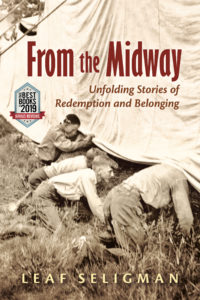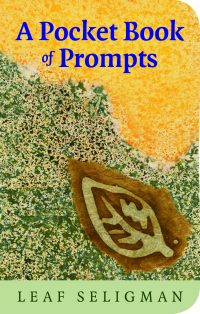
Meet Leaf Seligman
Q&A with Leaf Seligman
Q: Did you learn anything while writing From the Midway: Unfolding Stories of Redemption and Belonging that surprised you?
A: Yes. If you’d asked me when I first started writing the stories (in the early to mid 1990s), what compelled them, what deep inner place, need, wound, or tenderness I was writing from, I would have said the stories began as an exploration of my own experience of outsiderhood, a very early feeling of freakishness. Even though most of the characters are displayed for their particular oddity, they share the same yearning to be seen, not gawked at—appreciated and known, beheld and beloved. They taught me how we all yearn to belong like leaves on the tree of life. By the time I returned to the collection in 2018, as I re-read the stories, I realized that they expressed the most human of longings to belong spiritually, to claim an immutable experience of oneness, interconnectedness with all being, with what some call God or the divine. The spiritual longing for connection in the stories arrested me: made me acknowledge the deep hunger I felt for an authentic spiritual expression and that gave birth to the last story in the collection.
Q: How does the physical place where you write influence your work? What did setting contribute to From the Midway as you wrote?
A: Where I wrote didn’t influence the work. Where I grew up did. Even though I have lived in northern New England my entire adult life, my southern childhood forms the literary landscape I inhabit. The sensory details from the state fair I attended as a child to the sounds of the tent revivalists, the fragrance of regional flora, the textures, all arise from my early years in Tennessee.
Q: What was the most difficult part of writing From the Midway?
A: I researched a lot for the book. I read about actual people who performed or were displayed as oddities. I watched the classic 1934 film Freaks. I read about the historical time period to accurately capture the era, the culture and the details of a traveling carnival and as I immersed myself in the specificity of all that, the challenging part was to allow my characters to create themselves, to invent lives as unique and particular to them as the lives of real people they might have encountered in their travels. As a fiction writer, I can do all the research I need to nail down the authenticity of historical detail but the only authentic feelings I can grant my characters are the ones I have experienced. Being willing to re-experience and honor those feelings was probably the most difficult part of the writing.
Q: From the Midway: Unfolding Stories of Redemption and Belonging is also an audiobook! What was the recording process like?
A: Exhausting and exhilarating! I felt compelled to record the audiobook myself since the characters live in me and I loved giving them audible voice, not just their voices on the page. And I found out how exhausting it is to concentrate so hard for so many hours. I learned about all the technical aspects including the danger of a hungry belly (I ate my lunch at the recording studio quite early to avoid any audible pangs the recording engineer could detect through his headphones). Keeping a character’s prosody and intonation consistent from story to story proved challenging. The day the singers came in to record their parts for the final story was truly one of the best days of my life. It was so joyful for me to hear their voices give life to the culmination of the book. I am indebted to the singers (and to my wonderful recording engineer).
Q: The characters in your book are each so distinct. My favorites to read were Lizard Man and the Dancing Girl, Lisabelle. Who did you enjoy writing the most?
A: In terms of enjoyment, probably Tiny because she has such a great sense of self. I enjoyed writing Leroy as well because he also claims himself and his beauty. Lizard Man is the heart of the book so I feel a special connection with him. Each of the characters taught me so much so I love and appreciate them all. If you asked me who I would invite to dinner, probably the Beasley men would not top the list but I would still invite them over so they could listen to everyone else and learn a few things themselves.
Q: In the Kirkus review for From the Midway, you were praised for avoiding “stereotyping or sensationalism” and creating complex, sympathetic characters out of unlikely outcasts. Was it challenging to embrace freak show tropes while avoiding clichés?
A: Because I identified with the characters so deeply I could pretty easily avoid the tropes and I worked hard to avoid sensationalizing them. They entrusted me with their full humanity and I undertook the writing as nothing less than a spiritual, even sacred, task. Each character’s emotional landscape borrows from some element of my own so that made it fairly easy to avoid the clichés. Had I not been willing to offer my own authenticity, vulnerability, uncertainty and yearning, I suspect the characters would have ended up as one or two-dimensional caricatures instead of fully dimensional beings.
Q: What are you reading right now?
A:The Nickel Boys by Colson Whitehead. I just finished the brilliant novel Transcendent Kingdom by Yaa Gyasi.
 Leaf Seligman began writing during her Tennessee childhood where she encountered the midway, tent revivals, and the Civil Rights movement. She has taught writing in colleges, jails, prisons, and community settings since 1985 and worked as a minister, a jail chaplain, a youth services caseworker, and a restorative justice practitioner. She is the author of Opening the Window: Sabbath Meditations and A Pocket Book of Prompts. Her current projects include a novel, a memoir, and a series of death row monologues, all attuned to redemption and belonging.
Leaf Seligman began writing during her Tennessee childhood where she encountered the midway, tent revivals, and the Civil Rights movement. She has taught writing in colleges, jails, prisons, and community settings since 1985 and worked as a minister, a jail chaplain, a youth services caseworker, and a restorative justice practitioner. She is the author of Opening the Window: Sabbath Meditations and A Pocket Book of Prompts. Her current projects include a novel, a memoir, and a series of death row monologues, all attuned to redemption and belonging.
-
 $22.50
$22.50


